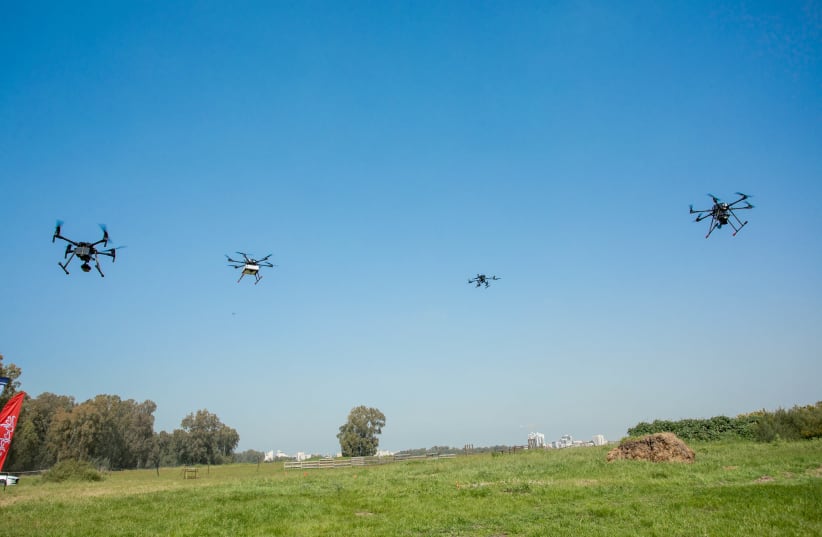Send in the drones. While the IDF has strongly embraced drones in recent years as one of its chief tools for gathering military intelligence, Israel is now looking to deploy drones for a growing number of everyday scenarios.
Last week, the Central Elections Committee raised some eyebrows when it said it will deploy drones for Tuesday’s elections to monitor lines at 751 special polling stations set up for the sick and quarantined. If drone handlers see that the lines are too long, voters will be sent to other special polling stations in vans and taxis, the committee said.
Now, the country is conducting large-scale testing for the creation of a national drone network for commercial deliveries, medical transport and urban air mobility, in what is seen as the most progressive project of its type in the world.
A plan to deliver Pizza Hut pizzas by drone by the summer, which was revealed last month by The Jerusalem Post, was just a small part of the plan, which may lay the groundwork for autonomous drone deliveries throughout Israel in the coming years.
In early 2020, the Israel Innovation Authority, along with the Transportation Authority, Civil Aviation Authority and other government bodies came together to try to create a national drone infrastructure that would completely transform the nation’s transportation infrastructure, explained Daniella Partem, head of the IIA’s Center for the Fourth Industrial Revolution.
Under this project, known as Naama, drones have flown more than 700 test flights over the past year in the north of the country, mostly to support the health system in dealing with challenges exacerbated by the novel coronavirus pandemic. But these flights were just the first step of a multi-layered three-year plan, Partem said.
“The next step was to create a situation where it’s not just one company flying one drone at a time manually, it’s five companies flying 20 drones in the same area autonomously, with a central operational system managing and tracking all the drones at the same time,” Partem said. “This was the first of a series of eight drone flight demonstrations that will be hosted one per quarter over the next two years, with more sophisticated and challenging scenarios each time, so the companies can develop the infrastructure over the long term.”
Last week, the city of Hadera hosted the first such trial, as five companies sent their drones on dozens of delivery missions across the area, all coordinated through a control room in Haifa, more than 50 km. away.
“There are two systems operating simultaneously, that of the drone operating company and the central traffic management system,” Partem said. “Each of these systems has to be developed and refined, and then they have to learn how to work together.”
The drones ran about 300 sorties a day, each simulating different tasks like food delivery, transporting medicine and medical equipment, or performing agricultural services. Each drone weighs about 25 kg. and is allowed to carry about 2.5 kg. in cargo, Partem noted.
“The goal is for each company to be able to fly multiple drones autonomously at the same time, with just one operator available to manually intervene if necessary,” Partem said. “That’s part of the challenge of making the system economically viable for the companies.”
Other challenges to be addressed in future trials include designing an automatic and manual system to avoid potential drone crashes, as well as establishing a prioritization protocol so that the control center will know to prioritize, say, a blood sample being sent for testing over a hamburger being delivered to a private customer, Partem noted.
To support the current phase of the pilot program, the five participating companies have been granted up to NIS 6 million for the total project, with the expectation that the companies will put up similar money of their own for the development. While all the companies participating are Israeli, non-Israeli companies will be invited to join the program without government funding in the future, Partem said. Participating in the Naama program with so many local, international, public and private stakeholders is an opportunity to achieve technological breakthroughs while removing regulatory barriers and enabling Israel to become a “beta-site” for drone piloting and operations, Partem added.
The program is just getting started, but nations around the world are watching closely. “Until a year ago, when the Naama Initiative was established, transporting cargo and delivering medical equipment by drones would have seemed like a distant dream,” said Dr. Ami Appelbaum, chairman of the IAA. “Today, it is becoming a reality. Demonstrations of simultaneous flights of dozens of drones are an unprecedented leap forward for the State of Israel – a monumental step towards a future of smart transportation, in which Israel is becoming one of the first countries worldwide to enable aerial cargo transport via drones.”
